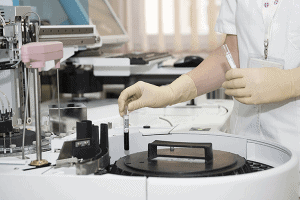In vitro fertilization (IVF) helps create an amazing number of happy families, with the Society for Assisted Reproductive Technology (SART) estimating more than 60,000 babies are born each year as a result of IVF.
 Despite the joy IVF can bring, reports have surfaced over the years touching on the potential risks associated with the procedure. One study recently claimed babies born through IVF were 1.25 times more likely to be born with an abnormality. It’s important to note, while these studies garner significant press coverage, the conversation about whether it is the IVF procedure or the underlying infertility itself increasing the risk for birth defects squarely remains a matter of debate.
Despite the joy IVF can bring, reports have surfaced over the years touching on the potential risks associated with the procedure. One study recently claimed babies born through IVF were 1.25 times more likely to be born with an abnormality. It’s important to note, while these studies garner significant press coverage, the conversation about whether it is the IVF procedure or the underlying infertility itself increasing the risk for birth defects squarely remains a matter of debate.
The prevailing notion is that prospective parents with fertility issues face a higher risk for birth defects in their children regardless of whether or not they pursue IVF. A recent investigation published in Seminars in Fetal & Neonatal Medicine noted, while use of assisted reproductive technology (ART) appears to increase the risk of birth defects by 30%, the risk among subfertile couples who manage to become pregnant without the use of ART is 20% – which the authors suggest means, “the increase in birth defects is due less, if at all, to ART protocols per se than to the biological perturbations that generated the infertility that necessitated ART to achieve pregnancy.”
This theory was also tested in a study published in the New England Journal of Medicine evaluating nearly 310,000 resultant births in the following categories of pregnancy:
- Pregnancies in women who received treatment with ART
- Spontaneous pregnancies in women who had a previous birth with assisted conception
- Pregnancies in women with a record of infertility but no treatment with assisted reproductive technology
- Pregnancies in women with no record of infertility
 The investigators concluded, after controlling for parental factors like underlying fertility, “The increased risk of birth defects associated with IVF was no longer significant.”
The investigators concluded, after controlling for parental factors like underlying fertility, “The increased risk of birth defects associated with IVF was no longer significant.”
Drilling down further, it’s important for parents to know research suggests the risk of birth defects in multiple gestation pregnancies can be decreased by opting for thawed IVF embryos rather than fresh embryo transfer.
Although risks associated with IVF treatment should still be properly communicated to prospective parents, there are distinct advantages to IVF that can help quell concerns. These benefits include:
- IVF provides the best opportunity for women with blocked tubes to conceive a child
- Older women have a better chance of conceiving when they pursue IVF treatment
- Couples experiencing male infertility will have a much higher chance of conceiving if they pursue IVF
- Patients with endometriosis, PCOS or premature ovarian failure can benefit from IVF
To discover more about the effectiveness of IVF and to find out if it’s right for you, please consider scheduling a consultation.






